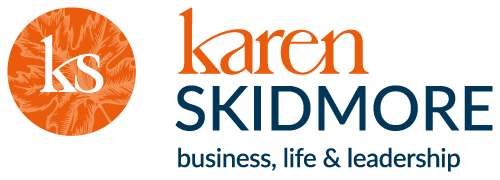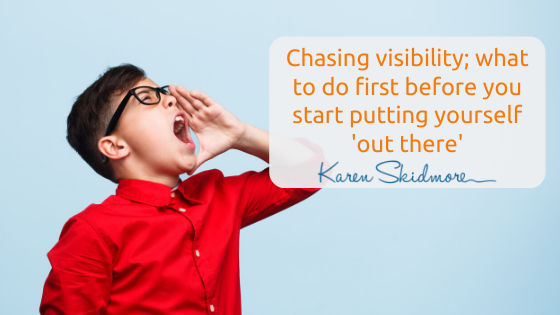With the set up of each new social media profile, there comes the drive to get noticed.
Some of you may start your journey into social media by lurking; silently watching, clicking and reading everyone else’s content as you scroll through your news feeds. At some point, you may feel ready to participate so you start to comment and share interesting stuff that you find useful. But you quickly realise that spending all your time reacting to what you scroll through, just becomes a huge time suck. The hours that you spend scrolling, clicking and scrolling some more, doesn’t land you any clients. Quite rightly, you begin to question what you’re doing.
But then, at some point, you find yourself falling down Alice’s rabbit hole of visibility.
Social media experts will often talk about the importance of visibility because if you aren’t seen, your potential clients are not going to find you. I am sure you already know that your clients aren’t sitting around, waiting to discover you. In fact, if you’ve been in the business game for long enough you will already know that most of your clients don’t even know they want you until you start conversing with them and exploring opportunities together. Thus starts the chase to find out how you can become visible, following the theory that if you appear more often to more people in the social news feeds, you are more likely to be found.
There are 3 big problems with this theory.
- Visibility can kick up a big shit storm for a lot of people. ‘Who am I to be sharing this?’ ‘I’m not an expert.’ ‘What if people find out I’m really a fraud?’ Even before you’ve started dealing with your content plan and what kind of posts you are going to create, the fierce winds of doubt come racing through to put a stop to any kind of activity.
- Introverts can have a huge problem with the thought of being visible. A lot of social media content and visibility strategies taught today are taught by extroverts; those people who love to be in the spotlight. It doesn’t mean introverts can’t be visible, but the way that extroverts teach visibility can frustrate a lot of people, particularly if you know you are Highly Sensitive Person (HSP).
- Some high visibility strategies can have you busy, rather than productive. Social media is NOT your only marketing tool and yet many social media marketing experts will have you believe that Facebook or LinkedIn are the only places where to find your clients. Plus it’s very easy to overcomplicate your marketing and be spending too much of your time creating multi-level funnels because that’s what you’ve been told will ‘work’ for you.
Visibility is important, and yes social media gives you the opportunity to ‘get yourself out there’. But let’s get real about what visibility really is and how it applies to you and your business. Before you start creating your content plan and psyching yourself up for your daily Facebook Lives, here are seven things to work through.
Define what visibility means to you
Before you decide to throw yourself into any visibility marketing challenge, take a moment to ask yourself what visibility means to you. With many of the clients I work with, visibility isn’t about being seen by everyone, all of the time.
Visibility is about being seen by the RIGHT people.
Before you do any work on developing a content plan or deciding to begin a daily Facebook Live practice, you have to get really clear on exactly who you want to engage with. You may call them client avatars or ideal clients, but in my experience, too many people bypass this important step of any marketing strategy.
Define how many people you really need to engage with
Another important step I help my clients work out is their Business Heartbeat. This is the number of leads, prospects and sales you need each month in order for you to make the revenue you need. When you do this work, you often find you need to be visible to far fewer people. For example, if you are selling a £2,500 product or programme, your capacity for taking on new clients maybe just four new clients a month. So if it’s just four people you need to sell to, then how many people do you really need to be visible to? This can massively help those of you who get, quite rightly, overwhelmed by feeling they have to be chasing visibility statistics such as post views, number of likes and shares.
Unfollow and declutter your own newsfeed
It’s really easy to let other people’s visibility kick up your shit storms of fears and doubts. If you struggle with comparisonitis (And who doesn’t?? It’s only human and I challenge anyone who says they never get affected by this!), then control the machine that feeds it. You have total control over what appears in your news feed.
Unfollow people who don’t inspire you or even trigger you. Don’t kid yourself that you need to know what your competitors are doing. Other people’s stuff just distracts you and you need to focus on your own game.
Unlock your limiting beliefs
Don’t just push down your fears; bring them out in the open and deal with them. Some people are able to read an inspirational quote and feel fired up enough to charge forward with a new content plan. But for most of us mere mortals, there are often some deep-rooted limiting beliefs that need unpicking.
At a recent Mastermind Day that I run for my Impact Momentum members, one of my clients opened up to some real fears about her visibility. Because of the work that she did before she started her business, she had to be very careful of how she appeared online so that patients couldn’t find and connect with her whilst she was working professionally with them. There was a genuine reason why she was finding it difficult to shift herself now into visibility mode. A daily motivational quote wasn’t going to cut it here; she had to do some work on rewiring her thinking and making sense of her new journey.
Introvert versus extrovert
The more you know yourself, the easier you will find marketing. Every one of us is unique and you will have your own set of personality traits that you can decide whether you were born with or you adopted based on life experiences. There will be some parts of your personality that you know are strengths, and there will be other parts of you that you may not like, or feel are weaknesses.
I believe that you don’t need to overcome these perceived weaknesses or that you need to have a specific entrepreneurial profile to make your marketing successful. When you accept who you are, right here and now, and know that whoever you are, you can design a business that showcases the best darn version of you. So rather than change who you are, change the way you market yourself and show up. It’s far easier. What this means is that it is OK for introverts to hate Facebook Lives. And it’s OK for extroverts to love them. You can be visible to the right people without having to do Facebook Lives; find your way of creating content, engaging and getting visible with the people who matter to you.
Know your metrics … but know that they aren’t everything
On a final note, I wanted to remind you that visibility for the sake of visibility is waste of your time and resources. The social media platforms are designed to keep you hooked. The number of likes and comments are there to draw you back in. Those three little dots that go up and down to signify that someone is commenting or responding to a message – yes, they are designed to keep you staring at the screen to wait. They have you hooked to be ready and waiting and staying online.
The algorithms share what is ‘popular’ but does that mean you only rely on their calculations to have your posts seen? No. Because you can reach out to individuals. You can engage with people. You can have conversations by picking up the phone, arrange to meet people for coffee or set up a meeting at the next conference or event you’re attending (or even speaking at). The clients I work with are never going to be social media influencers; that’s not their strategy. So be careful of being sucked into similar high visibility strategies that focus on the numbers game, rather than the impact you make with the people you want to engage with.
Visibility is important but what I hope I’ve been able to give you here today is a fresh perspective on how you approach this topic. Visibility is not just about creating content (noise?!) and sharing it on social media. Visibility could mean local networking. It could mean keynote speaking or it could be as simple as making sure you attend the top three industry conferences and events. It’s very easy to end up with over-complicated, digital marketing that ends up burning you out because you don’t enjoy the endless pressure to have to ‘show up’.
Take this time to step back and decide on how visibility can work for you and your business before you dive into creating a content plan. Visibility can be far simpler than you may think right now.









Thank you, I needed to hear this today as been beating myself up about not being visible!
Sometimes I love it, other times I really don’t but that leads to inconsistency, so for me it’s finding a way that I can show up consistently, even when I’m not feeling it and wanting to hide.
Also, remember that you can define what consistently means to you. It’s easy to feel that consistent means daily or twice a week. I find I go in rhythms; maybe once a day for a week and then I retreat for a few weeks until I am ready to be ‘visible’ again. And know that if you are wanting to hide, that’s OK. Find other ways such as writing or creating content in hiding, until your next cycle of energy allows you to share it publicly.